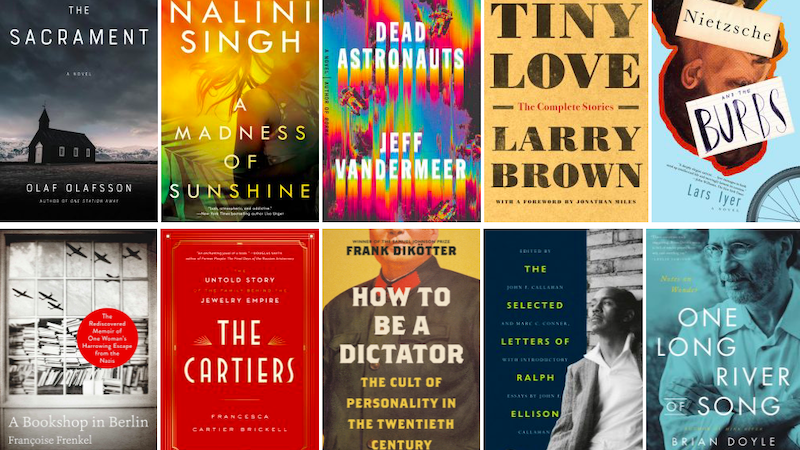
JeffVanderMeer’s Dead Astronauts, Francoise Frenkel’s A Bookshop in Berlin, and Olaf Olafsson’s The Sacrament are among the most critically-acclaimed books of the past seven days.
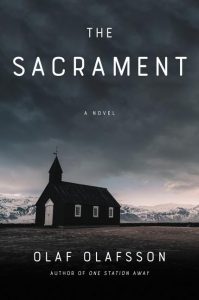
1. The Sacrament by Olaf Olafsson
3 Rave • 3 Positive • 1 Mixed
“The latest from Olafsson…feels at first like a classic study in Scandi noir, that austere genre of frosty characters and snow-flecked mystery. But something more tender and ephemeral lurks beneath Sacrament‘s bare outlines … Moving in clean declarative prose between ’60s Paris, ’80s Iceland, and the modern day, the novel’s core temperature sometimes runs too cool; there’s real devastation, though, in the revelations of its final chapters, and freedom, too.”
–Leah Greenblatt (Entertainment Weekly)
Read an excerpt from The Sacrament here
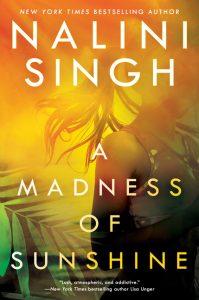
2. A Madness of Sunshine by Nalini Singh
4 Rave • 1 Positive • 1 Mixed
“…a complicated, compelling story that addresses the pain posed by the title of Thomas Wolfe’s famous book, You Can’t Go Home Again … A Madness of Sunshine doesn’t condescend to readers; it is through inferences and Maori phrases that Anahera’s ethnicity is made obvious … Set aside the weekend before starting A Madness of Sunshine because it’s unputdownable. Check out your airline miles too because after you finish, you may want to accept Nalini Singh’s invitation to visit her ‘distant country’ … beautiful.”
–Janet Webb (Criminal Element)
Read Nalini Singh on the crime stories of New Zealand here
3. Dead Astronauts by Jeff VanderMeer
2 Rave • 5 Positive • 1 Mixed • 1 Pan
“VanderMeer, whose imaginative novels are fed by his fecund home state of Florida, wants us to inhabit the minds of his ravenous bird and the massive fish held in a tank. It’s actually not that far off from the world we know—and perhaps that’s the point. Who hasn’t wondered what it’s like to be a bird swooping from the sky? These monsters become less monstrous when we live inside their (often hungry, often angry) heads … When writers are working in a series, there is a risk that its world will close in on itself. This world began with Borne, the story of a woman living in a broken-down apartment building in the City who finds a cuttlefish-slash-houseplant with the awareness of a little boy. With Dead Astronauts, VanderMeer has expanded to a multiverse with a poisoned past, engineered monsters and a possibly redeemable future, all from something that was merely decoration. There’s no limit to where it might go next.”
–Carolyn Kellogg (The Los Angeles Times)
Ann and Jeff VanderMeer talk classic fantasy, fearsome ducks, and dead astronauts
4. Tiny Love: The Complete Stories by Larry Brown
4 Rave
“…blunt and brilliant stories … [Brown] knew the hidden details, and told vibrant, strangely funny stories featuring the grit and detritus of hardscrabble lives in the fetid South. The voice was plain, direct, quite often close to confessional, at other times clearly confessional. His heart was big and his arms spread wide. He didn’t look away from characters who had an obvious flaw, or a couple of them, maybe more, and they were never portrayed as less than human, beyond concern, unworthy souls. He challenged the reader to give a damn … The major entertainments on display are hitting the sauce and the search for love, as love and all the tipsy complications provide the ongoing drama in these people’s lives.”
–Daniel Woodrell (The New York Times Book Review)
Read Jonathan Miles’ essay, “Larry Brown’s Long and Tortured Struggle to Make Himself Into a Writer,” here
5. Nietzsche and the Burbs by Lars Iyer
2 Rave • 2 Positive • 1 Mixed
“… Iyer makes nihilist philosophy hip and fun in his highly entertaining tragicomedy … Iyer writes in short, emphatic elliptical sentences, a little maddening in their repetition but effective in creating a mood of rebellious adolescence. The style works in portraying the young characters’ molten thoughts and emotions, as well as in satirizing the suburbs and school life … As much fun as Iyer has in hilariously sending up tract houses and golf courses, he’s at his satirical best describing the social stratification in the school … There’s something daring and poetic in the main characters’ resistance to suburban culture … The characters don’t just talk philosophy; they embody it in their decisions and actions. They test their surroundings with radical ideas. It’s an exhilarating ride, evoking the grandiosity of youth and the dynamics of counterculture itself.”
–Scott Neuffer (Shelf Awareness)
**
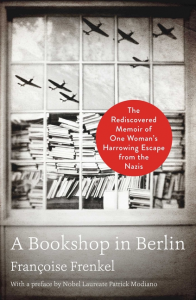
1. A Bookshop in Berlin: The Rediscovered Memoir of One Woman’s Harrowing Escape From the Nazis by Francoise Frenkel
6 Rave • 3 Positive
“Frenkel’s chronological first-person narration details narrow escapes, serendipitous respites, and acts of unbelievable cruelty, indifference, bravery, and kindness. Her story is compelling not only because it sheds light on a unique aspect of WWII (foreign nationals trapped in France during the German occupation) but due to the circumstances of its publication. Originally published in France in 1945 under the title No Place to Lay One’s Head, the book remained largely forgotten until a copy surfaced in southern France in 2010, leading to this English-language release. Insightful, sympathetic, suspenseful, and eventually triumphant, this memoir is a worthy addition to the WWII canon.”
–Kathleen McBroom (Booklist)
Read an excerpt from A Bookshop in Berlin here
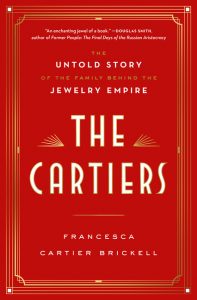
2. The Cartiers: The Untold Story of the Family Behind the Jewelry Empire by Francesca Cartier Brickell
2 Rave • 7 Positive
“… as much a tribute to a bygone era as a thorough account of modern luxury … The author tells us that her grandfather was initially reluctant to discuss Cartier’s early history: Ge was ashamed that it was his generation that had failed to keep the company in the family. But he gradually embraced the project, and his accounts are the beating heart of The Cartiers, elevating this from a company story to a human story—one even the unadorned will read with pleasure.”
–Sadie Stein (The New York Times Book Review)
3. How to Be a Dictator: The Cult of Personality in the Twentieth Century by Frank Dikötter
1 Rave • 8 Positive • 2 Mixed
“In How To Be A Dictator, historian Frank Dikötter provides a timely reminder of just how destructive toxic insecurity, and its corollary, pathological narcissism, can become … Nothing in the sorry sagas of Trump and Brexit compares remotely with the atrocities committed by the dictators in Dikötter’s new book. But in terms of the dynamics of narcissistic authoritarianism, there is much in How To Be A Dictator that is of critical contemporary relevance … History only makes sense if we understand the psychological pathology that underlies it, and our own propensity for partaking in such pathology. We need a clear-eyed understanding of history as a recurring series of monumental follies, led by cretins who duped or forced millions of us into humiliating childish submission. Only then can we hope to avoid the repetition. Dikötter, in his previous outstanding books on Mao, and again here in How To Be a Dictator, is in the vanguard of historians opening our eyes to this fundamental truth.”
–Ian Hughes (The Irish Times)
4. The Selected Letters of Ralph Ellison, Ed. by John F. Callahan and Marc C. Conner
4 Rave • 3 Positive
“This book is a treasure. It serves in part as an alternative to the view of Ellison provided by Arnold Rampersad’s 2007 biography, a highly informative, eminently readable work that nonetheless portrayed its subject as something of a cold fish. The man who emerges from Selected Letters is complex and has his prickly moments but comes across, in the main, as a warm human being who valued artistic achievement, meaningful intellectual exchanges, good music, Southern cooking, a sip of whiskey and good times with old friends. And in an age when people text because they can’t be bothered with email, it is a pleasure to read the letters of one who wrote at length, thoughtfully, and with wonderful humor about everything from family stories to literature to the state of his nation to—inevitably—race.”
–Clifford Thompson (The Wall Street Journal)
Read an excerpt from The Selected Letters of Ralph Ellison here
5. One Long River of Song: Notes on Wonder by Brian Doyle
5 Rave • 1 Positive
“If you are in love with language, here is how you will read Brian Doyle’s posthumous collection of essays: by underlining sentences and double-underlining other sentences; by sometimes shading in the space between the two sets of lines so as to create a kind of D.I.Y. bolded font; by marking whole astonishing paragraphs with a squiggly line in the margin, and by highlighting many of those squiggle-marked sections with a star to identify the best of the astonishing lines therein … This book is what Van Zandt’s greatest hits would look like had he lived to be 60, and if every song on the record hit the bar set by Pancho and Lefty … God’s acolyte is Doyle himself, missing not a single gorgeous blessing in a life so full of love it spilled over into essay after essay after essay … Doyle was also both hilarious and fierce, and I took as much pleasure from watching him address a denizen of the gun-rights coalition as ‘dear outraged shrieking lunatic,’ as I took from lingering over the loveliest descriptions of the natural world I have ever read … arguably a two-page master class in environmental writing. It also offers a fit description of the experience of reading this remarkable book: ‘a feeling eerily like a warm hand brushed against your cheek, and you sit there, near tears, smiling, and then you stand up. Changed.'”
–Margaret Renkl (The New York Times Book Review)
Read an excerpt from One Long River of Song here

